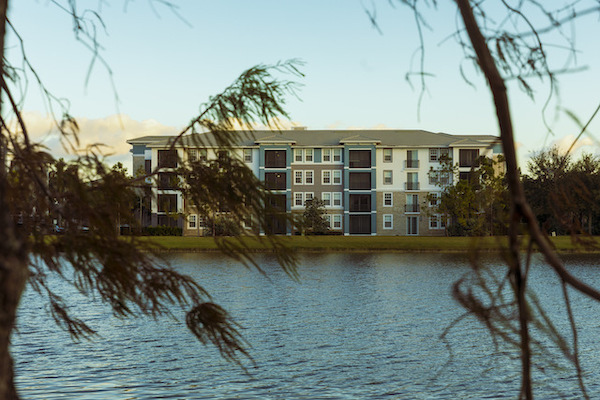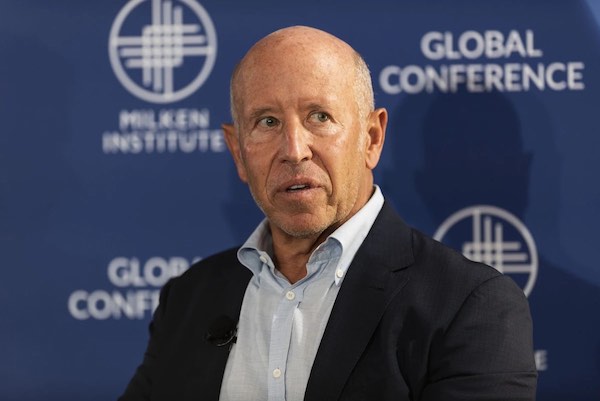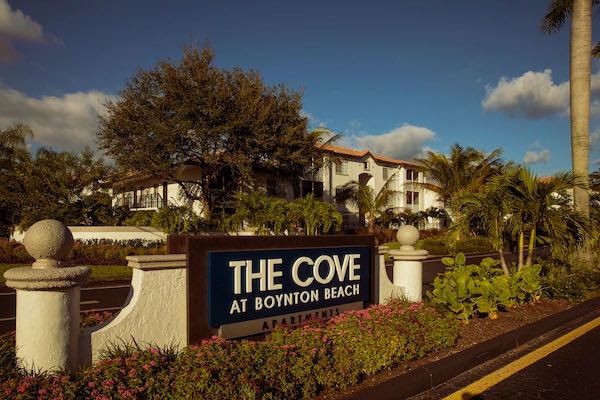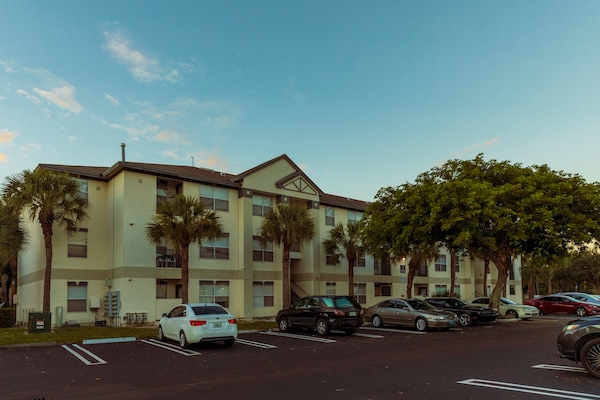Rising rents were a crisis for tenants. For Starwood, they were a gift.
The company has become one of the nation’s largest landlords in recent years and imposed some daunting rent hikes

For tenants across the country, the huge rent hikes of recent years have been a burden. For the private investment firms emerging as America’s landlords, they’ve been a bonanza.
Amid a flurry of sales over the past decade, when more than $1 trillion of apartment buildings changed hands, private investors and real estate trusts went on a binge: The proportion of apartments sold to them rose from 44 percent in 2011 to 70 percent in early 2022, according to data and research firm MSCI.
Many of those same firms imposed aggressive rent increases and rode the historic wave of rent hikes to big profits.
Few, however, stood to benefit more than Starwood Capital Group.
A private investment firm led by Florida billionaire Barry Sternlicht, Starwood has been one of the most active acquirers of apartments, and a model for the industry. Over the past seven years, it has amassed a portfolio of more than 115,000 apartments, which by some rankings stands as the nation’s largest such collection.
Private firms rarely disclose specific information about rent hikes, but according to leases reviewed by The Washington Post, prices at some Starwood complexes increased by 30 percent or more annually.
At Starwood’s Estates at Wellington Green in Palm Beach County, Fla., the company raised some rents by as much as 52 percent in 2022; at the Griffin Apartments in Scottsdale, Ariz., it increased them by 35 percent over the same period. At the Cove at Boynton Beach in Florida, it boosted rents on some units by as much as 93 percent in 2022.
At some Starwood apartment complexes intended for low-income tenants and built with government subsidies, the company increased rents by 10 percent. Though the rents on such units are limited by Department of Housing and Urban Development guidelines, the company began charging higher rent soon after the government lifted the limits, even for tenants who were mid-lease.
“Tenants seem capable and willing to pay these rent increases,” Sternlicht said in early 2022 in a call with investors. “I think this is the strongest real estate market I’ve seen in 30 years, 35 years.”
While Starwood says its prices merely reflect market forces and its own rising costs, the growing role of private investors among the nation’s apartment landlords coincides with a historic wave of rent hikes.
In 2021, rent increases were more than double what they had been any previous year, according to the Yardi Matrix Multifamily National Report, with asking rents jumping by 10 percent or more in 26 major metropolitan areas. The increases continued through at least October 2022, when rents were rising about 8 percent annually.
“When they said my rent was going up, I was like, ‘What in the world?’” said Sakeema Rainner, 29, who with her four children rented a government-subsidized, Starwood-owned West Palm Beach apartment where she said the rent jumped about 10 percent in 2022. “They just don’t care.”
Starwood provided some figures to The Post showing that the company raised rents at an average rate of 17 percent in its top 10 markets from January to September 2022. By comparison, overall rents rose in those same markets at a rate of about 12 percent over that period, according to numbers from CoStar, the data firm, shared by Starwood.
The company raised rents more slowly than competitors in 2021, however, according to the figures it provided: It boosted rents by an average of 6 percent while competitors in those markets raised rates by an average of 12 percent.
In a statement, the company said that it has a legal responsibility to reward its investors and that it is “contending with record increases in operating expenses and interest on our mortgages.”
“Starwood is one of the world’s premier real estate investors and owner of apartment properties,” the company said in its statement. “Our reputation is extremely important to us both as an investor and a landlord, and it is something we take very seriously. We would not have been able to grow and maintain our portfolio at this size if we acted differently than any other landlord in this space.”

Contrary to Sternlicht’s assessment that tenants are “capable and willing” to pay more, those at several Florida apartment complexes owned by Starwood affiliates said they are struggling to pay the higher rates.
Of 20 people interviewed across four complexes in Palm Beach County, where rent hikes have been particularly sharp, all said they felt a pinch from increases that ranged from $100 to $1,363 more per month. Many were people of modest incomes. Some work two jobs. Among them were home health aides, a pool cleaner, security guards, warehouse employees and restaurant workers.
Veronica Stevens, 38, a worker at a cannabis dispensary, and her 17-year-old daughter share a two-bedroom apartment at the Cove at Boynton Beach, a Starwood property. Their rent is rising from less than $1,500 to $2,070 per month, she said, an increase of about 40 percent. Stevens and her daughter no longer dine out occasionally at Red Lobster or Chili’s as a result, and she is looking for a second job.
Robert Passaretti, 35, a restaurant server, said his rent at Starwood’s Reserve at Ashley Lake in Boynton Beach rose from $1,350 monthly to $2,050. He is thinking about leaving the state.
“It’s crazy,” he said. “All of a sudden I’m living paycheck to paycheck.”

Some families said they were forced into difficult downsizings: Couples with children moved from two-bedroom to one-bedroom apartments even though, as one father said, “we’re tripping over each other.” Another family with three children had a two-bedroom at the Reserve at Ashley Lake. A few months ago, they got a notice that the rent would be rising from $1,600 to $2,000 per month, they said. They moved in with a family member.
“We’re trying to save to get out of the cycle,” said the father, an immigrant from Haiti who sells life insurance, who spoke on the condition of anonymity to maintain his privacy. “The rents are never going to come down. We want to buy a house.”
Even at Starwood’s government-subsidized complexes, managers imposed rent increases of as much as 10 percent, according to leases reviewed by The Post.
Parkside Residences in West Palm Beach, for example, was built in 1996 with a low-interest state loan of $1.9 million and $800,000 in a tax credit subsidy, according to the Shimberg Center at the University of Florida. In return for the government subsidy, the owners of the property are obliged to keep rents below levels set by the federal government. Starwood Real Estate Income Trust bought the 144-unit property in 2020 for nearly $14 million.
On the last day of April 2022, it informed residents that their rents would jump by about 10 percent on June 1 — even if they were in the middle of their lease. A clause in the lease paperwork allowed the company to raise the rent as soon as HUD changed the maximum landlords are allowed to charge.
“They say it’s low-income but it’s so expensive,” said a 66-year-old nursing aide from Jamaica who splits an apartment with a friend from church and spoke on the condition of anonymity for fear of angering property managers. “They don’t care.”
A few doors down, Rainner and her four children share a three-bedroom apartment. They got the notice of the rent hike, too. But worse than the higher price, she said, is what she is paying for. For months, a leaky air conditioner has left large puddles in her living room every day and inundated the carpet in her bedroom. On a visit in October, the bedroom rug squished underfoot like a wet sponge. She said the mold that results causes her kids to cough.
“I call the office and no one answers,” she said.
Other affordable rental complexes owned by Starwood have drawn complaints about maintenance, too, according to local news reports: Tenants of the Nolen Grand complex for older residents in Dallas said the elevator was out of service for three weeks, leaving the frail to navigate flights of stairs with their walkers; tenants at the Courtney Manor apartments near Orange Park, Fla., said they were dealing with uncontrollable mold in their apartments; and tenants at the Santora Villas apartments in Austin complained of broken appliances and other maintenance issues.
Starwood attributed the elevator breakdown at the Nolen Grand to supply chain shortages. It has resolved the problems at Courtney Manor and Santora Villas, which the company said had been present when it purchased those properties. The company declined to comment on individual tenants’ situations.
“Like all property owners, our rental properties experience maintenance issues from time to time,” the company said in a statement. “However, we spend millions every year to correct those issues and are proud of our track record of addressing issues quickly and often times proactively to create a better living environment for our tenants. To suggest our performance in this area is somehow below industry standards by picking a few situations out of our hundreds of thousands of leases we own and manage is an unfair representation of how we conduct ourselves as a property owner.”
Bigger companies, swifter hikes
While rising rents are often justified as a simple matter of supply and demand, they are also the product of countless individual decisions by landlords.
Among the most aggressive landlords, researchers and industry experts say, are large investment groups that buy and sell apartments — especially those that are not trying to build a brand or reputation as an apartment company.
“At large outfits that invest in unbranded apartments, it’s just pure profit maximization,” said Russell James, a professor at Texas Tech’s School of Financial Planning who has studied tenant satisfaction at apartment buildings owned by large ventures. “There is less incentive to do anything other than charge the maximum amount.”
The shorter-term time horizon puts pressure on owners to raise rents because the price of a building often depends upon how much rent money it can produce. The way executives are paid also encourages rent increases: The managers of the investment firms often earn large fees based on profits, and those profits can be fattened with higher rents.
These firms “have an incentive to raise rents as quickly as they can so that they can get the next buyer to pay more,” said Michael Brennan, chairman of the Brennan Investment Group, a real estate firm, and director of the James A. Graaskamp Center for Real Estate at the University of Wisconsin at Madison. Other owners, he said, are “not as maniacally focused on getting the last nickel as quickly as they can.”
Starwood was founded in 1991 by Sternlicht and investment partner Bob Faith to buy up apartment buildings after the savings and loan crisis. Today, its apartment portfolio is ranked as one of the largest in the United States, and it is just one piece of its global real estate empire: Starwood Capital Group manages about $125 billion of investments around the world: hotels, land, offices, industrial parks, apartments and mortgage-backed securities. Starwood managers say they can shift among these varied investments quickly, similar to the way a firm might trade stocks and bonds.
Starwood’s biggest bet on apartments began five years ago, when it created a venture called the Starwood Real Estate Income Trust. After soliciting billions from investors, who were promised “regular, stable cash distributions,” it began assembling a varied real estate portfolio. Among those purchases were dozens of apartment buildings with more than 65,000 units, according to Starwood documents.
How to set rents is one of the questions that divides landlords, particularly for tenants already in the building when rents are rising. When the market price of an apartment surges by 30 percent, it may be easy enough to ask new tenants to pay the higher price — they haven’t moved in yet and can take it or leave it. But should a 30 percent increase be foisted on tenants that have been living there for years?
A Starwood executive weighed the question at an industry event.
“We’re an ownership level that likes to be assertive,” Steve Lamberti, the president of Starwood’s property management division, Highmark Residential, told the audience at an industry webcast that was sponsored by RealPage, a company that provides software to property managers.
“Compassion is a word all of us need to think about,” he said, but he added that landlords should recognize that the prices for existing tenants should “run pretty similar” to what the market is dictating.
“We’re in a position now where occupancy is extremely strong and we are pushing rents,” he said during the webcast.
After The Post viewed the webcast and sought interviews with some of its participants, RealPage removed the webcast from its public website. It later said the webcast was removed at the request of a client.

While apartment companies typically view tenants as their customers, the investment firms buying up apartments typically cater first to investors. To tenants, in fact, the investment firms that own their buildings often are invisible: Most interviewed for this story had no idea that their landlord is a Starwood affiliate.
Consider apartment ownership, for example, in Palm Beach County, where private investment groups now own more than half of the 30 most valuable apartment buildings — more than triple the number they owned 20 years ago, according to property assessor records and Post research.
Rents in the county rose by more than 19 percent on lease renewals as of May, according to data from RealPage, a rate that was almost twice the national average. Nowhere in the country did they rise faster.
A representative for Starwood noted that some large public real estate trusts — not just private investment groups — have raised rents by large amounts, too.
Quarterly data shows Starwood raised rents at its South Florida properties by about 21 percent in the 12 months ending in September. While the company declined to say how much its rents rose at individual Palm Beach County properties, The Post was able to determine rent increases from eviction files. Each eviction file in Florida includes a copy of the lease. If an apartment was the site of two evictions, it is possible to see how much the rent had been increased between the two evictions. Some tenants also provided information about how much their rents rose.
Some of the biggest jumps at Starwood properties happened, as might be expected, after an apartment became vacant.
The lease for unit 306 at the Estates at Wellington Green apartments was $1,603 per month in January 2022; five months later, the company was charging $2,444, a 52 percent hike, according to the leases in the court files.
The lease for unit 938 at the Reserve at Ashley Lake apartments cost $1,296 in March 2020; by October 2021, the price had jumped to $1,806, according to the leases.
The hikes on renewed leases were generally smaller, but not always.
One 24-year-old tenant at the Cove at Boynton Beach saw her rent nearly double in May from $1,464 to $2,827 as she shifted to a month-to-month lease, according to court papers. The company filed for her eviction in late June, saying she had failed to pay. In court papers, she wrote that she had paid for her mother’s funeral and was dealing with depression. She asked to be able to stay and asked the judge for an emergency hearing. The eviction had been ordered already. Her request was denied. She declined to comment for this story.
Another tenant, who lives with his daughter in a two-bedroom apartments at the Estates at Wellington Green, said he got a renewal notice that asked for a 24 percent increase — from $1,780 to $2,208. He spoke on the condition of anonymity to not risk angering the company.
Edgar Enrique, a pool cleaner from Guatemala who shares with his wife a one-bedroom at Starwood’s Reserve at Ashley Lake, said his rent jumped from $1,600 to $2,000.
“For me, it’s not good,” Enrique said. “Why does it cost $400 more now?”
Peter Whoriskey is a staff writer for The Washington Post whose investigative work focuses on corporate accountability and the economy.